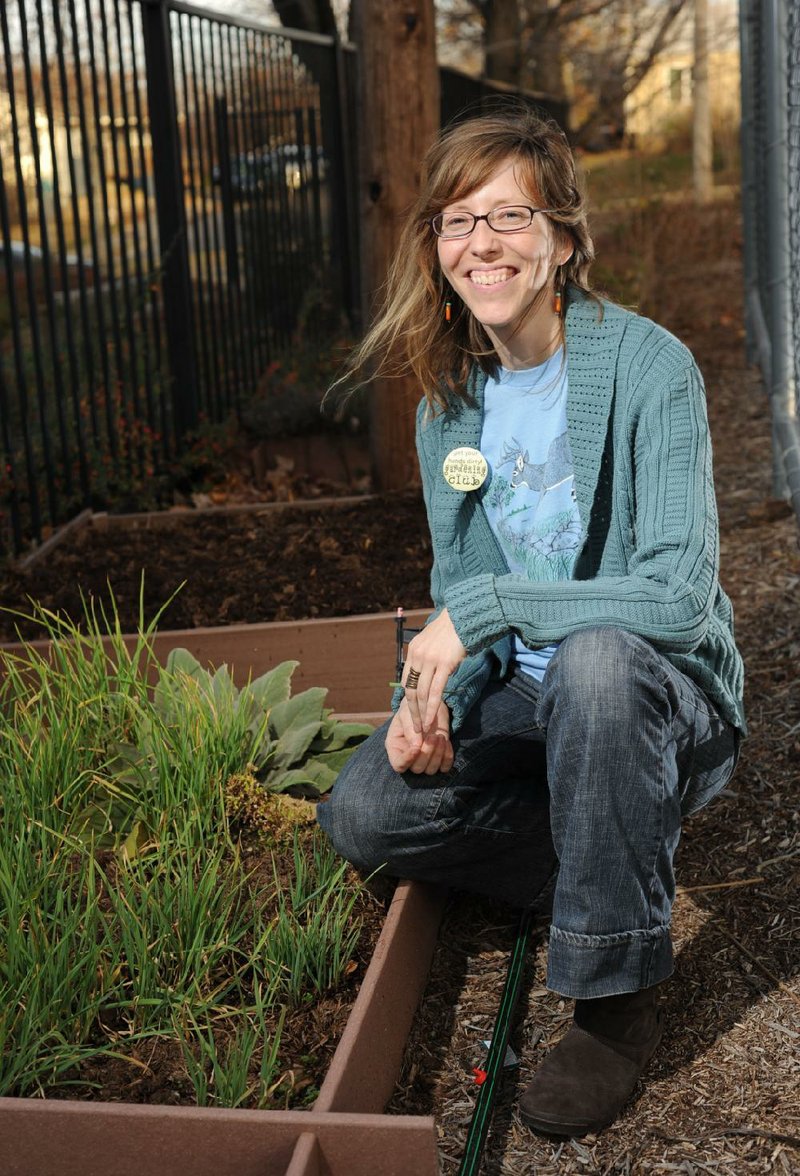FAYETTEVILLE — Every parent, Beth Ashbaugh included, has pleaded with their kids to eat their vegetables.
Often these efforts are met with minimal success, but Apple Seeds Inc. has figured out a way to make eating your vegetables cool - by teaching kids how to grow them.
“I can relate. I’ve done some of that same stuff with my own children,” says Ashbaugh, executive director of the Fayetteville-based nonprofit organization. “Where we’ve had success is we’ve got this environment where it’s kinda cool to do those things. We bring a lot of positive role models. A lot of young people from the university [volunteer] with us, and the kids really look up to them.”
Founded in 2007, Apple Seeds seeks to help children make healthy eating choices, while simultaneously promoting sustainable food systems. It currently offers after-school gardening clubs at three public schools in Fayetteville - Leverett Elementary and Butterfield Trail Elementary (both grades K-5) and Owl Creek (grades K-7) - and plans to begin a program at a fourth school, Root Elementary, in the spring.
Starting in March, Apple Seeds plans to be connected to all elementary and middle schools in Fayetteville through its Farm to School program. The organization is working with the Fayetteville School District to plan lunches that will highlight local food and contain an educational component; these lunches will take place around four times a month, Ashbaugh says.
The garden clubs and Farm to School program are part of Apple Seeds’ vanguard program, Plant to Plate - which dates to 2005, when it was known as Apples in the Classroom. Apples in the Classroom was founded by Ozark Natural Foods and was taken over by Apple Seeds in 2007; it renamed the program three years later to more accurately reflect what was being done.
Plant to Plate encompasses additional activities, such as field trips to farms and farmers markets, cooking classes and speakers from places like the University of Arkansas Cooperative Extension Service - who have taught the kids about everything from bugs to water.
“It’s a lot of fun,” Ashbaugh says. “The enthusiasm is contagious. Particularly with the kindergartners. ... One of the things they get a lot of excitement out of - and which surprised me, because it’s simple - is when we bring a truckload of compost out to fill the beds and a lot of buckets” for the kids to move it.
The garden clubs meet weekly after the school day has ended, Ashbaugh says, and they generally last around 10 weeks. They begin with sign-ups, and are first-come, first-served. Groups are limited to 15 children, Ashbaugh says, as opportunities to participate decrease when the groups get too large.
Before the first meeting with pupils, Apple Seeds officials talk with school administrators to better tailor the program to that school, and determine ways to tie it into the curriculum. At the first meeting, participants are given a healthful snack and the expectations for the coming weeks are outlined.
The organization focuses on kids from kindergarten through fifth grade.
“We’re not limiting ourselves to those ages; it’s just worked out that way,” Ashbaugh says. “We want to work with high schools [in the future]; we’re not set on certain ages. We feel like the younger the better, to get them started thinking about eating healthy.”
The program focuses on crops that can be grown during the school year. So during the fall months, that’s cooler-weather crops like cauliflower, broccoli and kale. (Some programs run over the summer, Ashbaugh adds, allowing them to grow warmer weather crops like tomatoes and watermelons.)
“Gardening is not an instant-gratification activity, so they like the radishes, because those grow really fast,” Ashbaugh says.
Ashbaugh, a mother of two who lives in West Fork, has been the executive director of Apple Seeds since April. She credits former executive director Keith Richards with getting the program started, and its countless volunteers for helping it run. It’s a volunteer-driven organization; Ashbaugh is the first paid employee in its history.
She came to Apple Seeds in 2009 through AmeriCorps VISTA, a national anti-poverty program founded in the 1960s. Today, there are two people who work with the program through AmeriCorps VISTA, which has been critical to Apple Seeds’ success.
“We would definitely not be where we are without the help from these AmeriCorps VISTAs,” Ashbaugh says. “We’re basically able to get a 40-hour [a week] person working for us for a whole year at least, and we haven’t had to pay into it at all.” For more information about Apple Seeds Inc., call (479) 957-0700 or visit appleseedsinc.org.
High Profile, Pages 37 on 12/23/2012
